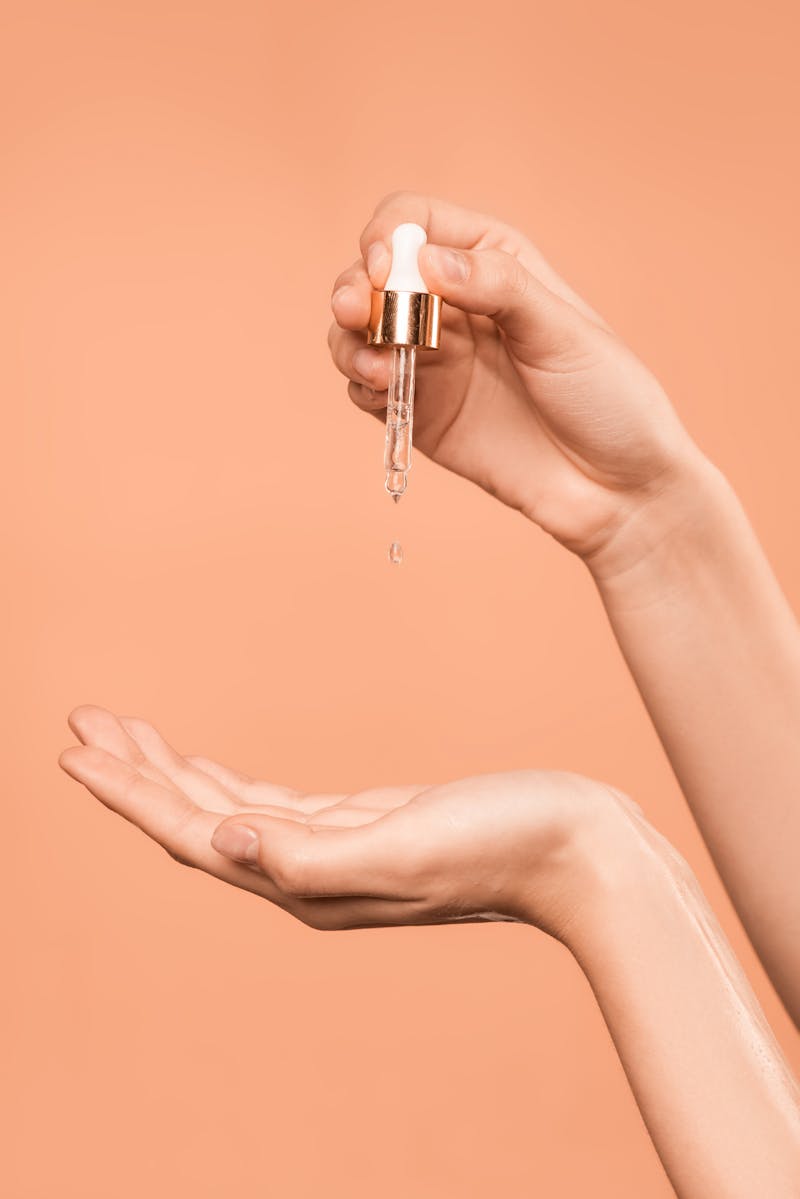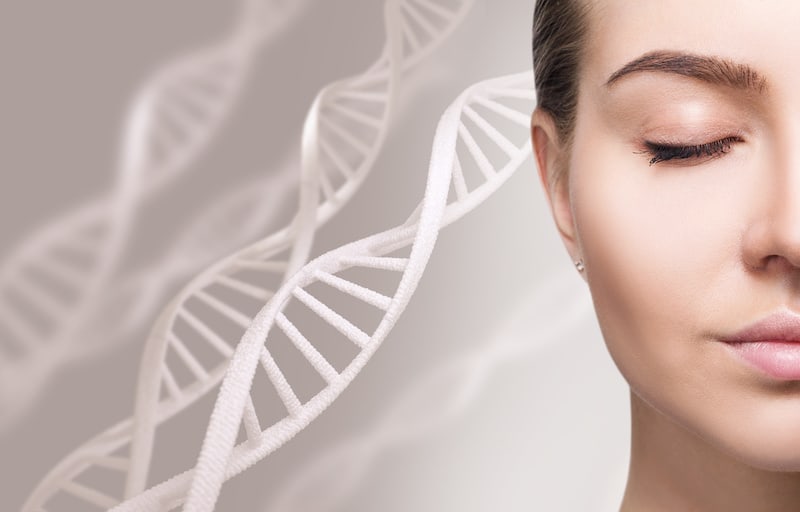Get Your AI Analysis
Personalized skincare insights
Discover your perfect skincare routine with our AI-powered analysis. Get personalized recommendations for glowing, healthy skin.
Start AnalysisFollow Us
Stay updated with the latest skincare tips, trends, and expert advice.
Biotech Anti-Aging: Science-Driven Solutions for Fine Lines
As a skincare veteran with over a decade immersed in the ever-evolving world of dermatology and beauty, I’ve witnessed countless trends come and go. Yet, few innovations have captivated me as much as the rise of biotechnology in anti-aging skincare. This isn't just another buzzword; it's a profound shift, offering science-driven solutions that work at the cellular level to precisely target fine lines and wrinkles. Forget superficial promises; we're talking about ingredients engineered in labs to communicate directly with your skin cells, prompting them to behave like their younger, more vibrant counterparts.

For years, our arsenal against aging focused on broad-stroke ingredients like retinoids and antioxidants. While incredibly effective, biotech takes this a step further, offering unparalleled precision. It's about harnessing the power of biology itself, creating compounds that our skin intrinsically understands and utilizes. If you're ready to move beyond traditional approaches and embrace a future where science delivers measurable results for smoother, younger-looking skin, you're in the right place. Let's dive deep into the fascinating world of biotech anti-aging.
Understanding the Genesis of Fine Lines
Before we explore the solutions, it’s crucial to understand what causes fine lines and wrinkles. They are not merely superficial creases but complex indicators of structural changes within the skin. At their core, fine lines are a result of:
Collagen Degradation: Collagen, a protein, provides skin’s firmness and elasticity. With age, its production slows, and existing collagen breaks down due to sun exposure and lifestyle factors.
Elastin Loss: Elastin gives skin its ability to snap back. As elastin fibers become damaged and less plentiful, skin loses its resilience.
Reduced Hyaluronic Acid: This naturally occurring sugar molecule holds immense water, keeping skin plump. Less HA means less hydration and plumpness.
Cellular Turnover Slowdown: Younger skin sheds and renews cells rapidly. Older skin’s cell turnover is sluggish, leading to dullness and uneven texture.
Repetitive Facial Movements: The constant creasing from expressions like smiling or frowning eventually etches lines into the skin.
According to a study published in the Journal of Clinical and Aesthetic Dermatology, UV radiation accounts for up to 80% of visible facial aging, including fine lines and wrinkles, by accelerating collagen and elastin breakdown. This underscores the need for treatments that not only mitigate damage but actively rebuild and rejuvenate.

The Biotech Revolution: Precision Skincare
So, what exactly is biotech skincare? It’s the application of biological engineering and cellular science to create highly specific, potent ingredients. Instead of relying solely on naturally derived extracts, biotech harnesses the power of controlled lab environments to synthesize compounds that are bioavailable (easily recognized and utilized by the skin) and incredibly effective. This means ingredients can be produced with consistent purity, potency, and sustainability, often surpassing the limitations of traditional ingredient sourcing.
Biotech ingredients are designed to interact directly with cellular pathways, signaling processes, and genetic expressions that control skin health and aging. They don't just sit on the surface; they delve deep to influence how your skin behaves.
Pillars of Biotech Anti-Aging: Key Ingredients
1. Growth Factors: Cellular Messengers of Youth
Growth factors are naturally occurring proteins that play a crucial role in cell proliferation, differentiation, and tissue repair. In biotech skincare, these are often engineered to be identical to the growth factors found in healthy, young skin. They act as messengers, telling skin cells to produce more collagen and elastin, accelerating wound healing, and improving cellular turnover.
Clinical studies have consistently shown that topical application of growth factors can lead to significant improvements in skin elasticity, firmness, and the reduction of fine lines. For instance, a 2012 study published in the Journal of Drugs in Dermatology demonstrated that products containing human growth factors led to a 20-30% improvement in fine lines and wrinkles over 60 days.
Product Recommendation: AnteAGE MD Serum, which utilizes growth factors and cytokines derived from human bone marrow stem cells, and Neocutis Bio-Cream Firm, featuring Human Growth Factors (HGFs) and proprietary peptides.
"Growth factors represent a paradigm shift in anti-aging. They don't just treat symptoms; they communicate directly with your skin to regenerate itself, promoting a truly youthful renewal from within." – Dr. Shereene Idriss, Board-Certified Dermatologist
2. Plant Stem Cell Extracts: Nature's Regenerative Power
While human stem cells in cosmetics are a complex ethical and regulatory area, plant stem cells offer a fantastic alternative. These are not whole plant stem cells but extracts derived from the calluses of plant stem cells, which are rich in protective compounds, antioxidants, and epigenetic factors. They are known for their ability to protect human skin stem cells from environmental damage, boost cell vitality, and promote healthy tissue regeneration.
By safeguarding our skin’s own stem cells, these biotech wonders indirectly support the production of collagen and elastin, helping to maintain the skin’s youthful architecture and reduce the appearance of fine lines. They are especially potent in combating oxidative stress.
Product Recommendation: Tatcha The Dewy Skin Cream incorporates Japanese anti-aging superfoods, including rice, green tea, and algae, with a focus on delivering healthy, youthful skin. While not directly 'plant stem cells' in the cellular sense, brands like Dermalogica Phyto-Nature Firming Serum utilize plant-derived biomimetic peptides and stem cell extracts to synergistically work on skin firmness and elasticity. Another example is Dr. Brandt Lineless Lines No More Serum, which uses plant stem cell technology to plump and smooth the skin.

3. Bioidentical Peptides & Neuropeptides: Targeted Signaling
Peptides are short chains of amino acids, the building blocks of proteins. Bioidentical peptides are lab-engineered to precisely mimic the natural peptides found in our bodies, allowing them to effectively communicate with skin cells. They can signal cells to produce more collagen (collagen-stimulating peptides), inhibit enzymes that break down collagen, or even relax muscle contractions (neuropeptides, often referred to as 'topical Botox').
Collagen-Stimulating Peptides: Such as Palmitoyl Tripeptide-1 and Palmitoyl Tetrapeptide-7 (often found together as Matrixyl 3000), which tell fibroblasts to produce more collagen and elastin.
Signal Peptides: Like Copper Peptides, known for their wound-healing and collagen-boosting properties.
Neuropeptides: Examples include Argireline (Acetyl Hexapeptide-8), which aims to temporarily relax facial muscles, thereby reducing the depth of expression lines.
A meta-analysis of studies on topical peptides concluded that they significantly improve skin elasticity and reduce wrinkle depth, with some showing effects comparable to low-concentration retinoids, but with less irritation. This makes them ideal for sensitive skin types.
Product Recommendation: The Ordinary "Buffet" + Copper Peptides 1% for a broad spectrum of peptide benefits, and Paula's Choice Peptide Booster, which combines eight different peptides for comprehensive anti-aging.
4. Enzymatic & Fermented Ingredients: Enhanced Delivery & Renewal
Biotechnology also leverages biological processes like fermentation to create incredibly potent and bioavailable ingredients. Fermented ingredients often have smaller molecular structures, allowing for deeper penetration and more effective delivery of active compounds. Enzymes, on the other hand, can gently exfoliate, improve cellular turnover, or even break down harmful substances on the skin.
For example, fermented probiotics can help fortify the skin's microbiome, enhancing its barrier function and reducing inflammation, which indirectly supports a youthful appearance. Enzymatic exfoliants, like those derived from fruits (papain, bromelain), offer a gentler alternative to physical or acid exfoliants, promoting smoother skin without irritation.
Product Recommendation: SK-II Facial Treatment Essence, renowned for its Pitera, a yeast-derived ferment that dramatically improves skin texture and radiance. Biossance Squalane + Lactic Acid Resurfacing Night Serum utilizes a fermented lactic acid for gentle yet effective exfoliation.
5. Exosomes: The Future of Cellular Communication
An emerging frontier in biotech skincare is the use of exosomes. These are tiny vesicles released by cells that carry proteins, lipids, and genetic material, acting as sophisticated messengers between cells. Exosomes derived from stem cells are being explored for their potential to deliver potent regenerative signals to skin cells, promoting repair, collagen production, and reducing inflammation with unprecedented precision.
While still in early stages of topical application, particularly in over-the-counter products, the potential for exosomes to revolutionize anti-aging by directly influencing cellular behavior is immense. Clinical trials are currently underway to fully understand their efficacy and safety in cosmetic formulations.
"Exosomes represent the next generation of regenerative skincare. Their ability to deliver targeted information to skin cells could unlock truly personalized anti-aging treatments, moving beyond broad-spectrum effects to hyper-specific cellular repair." – Dr. David L. Hill, Board-Certified Dermatologist and Cellular Biologist

Integrating Biotech into Your Skincare Routine: An Actionable Guide
Ready to embrace the power of biotech? Here’s how to strategically incorporate these cutting-edge ingredients for maximum benefit:
Step-by-Step Biotech Skincare Routine
Cleanse: Start with a gentle cleanser to remove impurities without stripping the skin.
Treat (AM): Apply a Growth Factor or Peptide Serum. These ingredients work wonderfully during the day to support skin repair and protection against environmental stressors. Look for serums with high concentrations of active ingredients.
Hydrate (AM): Follow with a lightweight, hydrating moisturizer.
Protect (AM): ALWAYS finish with a broad-spectrum SPF 30 or higher. Biotech ingredients optimize skin repair, but sun protection is non-negotiable for preventing future damage.
Cleanse (PM): Double cleanse if you wear makeup or heavy SPF.
Treat (PM): This is an excellent time for a Peptide-rich formula, Plant Stem Cell extract, or a Fermented Essence. If using a retinoid, alternate nights with your biotech serum or apply peptide products on nights you don't use retinoids.
Hydrate (PM): Lock everything in with a nourishing night cream.
Expert Tips for Optimal Results:
Start Gradually: Introduce one new biotech product at a time to see how your skin reacts.
Consistency is Key: Biotech ingredients, like any active, require consistent use over several weeks to show noticeable improvements. Expect to see initial changes in 4-8 weeks, with more significant results over 3-6 months.
Check Ingredient Lists: Look for products where the biotech ingredients are listed high up on the INCI list, indicating a higher concentration.
Layering Strategy: Apply thinner serums before thicker creams. Generally, biotech serums go on clean skin before moisturizers.
Consult a Professional: If you have specific concerns or very sensitive skin, consult a dermatologist to tailor a biotech regimen for you.
The Science Behind the Claims: Measurable Results
One of the most compelling aspects of biotech anti-aging is its foundation in rigorous scientific research. These aren't ingredients based on anecdotal evidence; they're developed with an understanding of cellular biology and tested for efficacy. For example, numerous clinical trials on synthetic growth factors and specific peptides have demonstrated measurable improvements in:
Reduction in wrinkle depth: Studies often report a 15-40% decrease in the appearance of fine lines and wrinkles.
Improved skin elasticity and firmness: Often measured via cutometry, showing significant increases in skin's ability to resist and recover from deformation.
Enhanced skin texture and tone: More even skin tone, smaller pore appearance, and a smoother surface.
Increased collagen and elastin synthesis: Biopsies sometimes confirm new protein formation.
A recent review in Cosmetic Dermatology highlighted that the global market for anti-aging products is projected to reach $282.6 billion by 2030, with biotech ingredients driving a significant portion of this growth due to their proven efficacy and consumer demand for science-backed solutions. This indicates strong confidence in the tangible results that biotech ingredients provide.
Navigating the Biotech Landscape: What to Look For
With so many products now claiming 'biotech' status, how do you choose wisely?
Look for:
Clear Ingredient Callouts: Brands that proudly highlight specific peptides, growth factors, or plant stem cell extracts.
Third-Party Testing & Clinical Data: Reputable brands will back their claims with scientific studies, often published or available upon request.
Stable Formulations: Biotech ingredients can be delicate. Look for products packaged in air-tight, opaque containers to ensure ingredient stability.
Concentration: While often proprietary, higher concentrations usually lead to better results. Research ingredient percentages where possible.
Synergistic Formulas: Many biotech products combine several active ingredients (e.g., peptides with antioxidants or hyaluronic acid) to create a more comprehensive anti-aging effect.
Ethical Considerations and Future Trends
As biotechnology advances, so do ethical considerations. Transparency in sourcing, sustainability of production processes, and rigorous safety testing are paramount. The future of biotech anti-aging is likely to see even more personalized solutions, with AI-driven diagnostics recommending custom formulations based on an individual's unique genetic predispositions and skin microbiome. We're on the cusp of an era where skincare isn't just about applying products, but about precise biological intervention.
From lab-engineered growth factors that whisper messages of youth to your cells, to bioidentical peptides that meticulously reconstruct your skin’s architecture, biotech anti-aging is not just a trend; it’s the evolution of skincare. It offers precision, efficacy, and results that are not just visible but measurable. Embracing these science-driven solutions means investing in a future where your skin's health and youthful radiance are supported by the most advanced innovations available. It's time to upgrade your routine and experience the profound difference that truly intelligent skincare can make.

